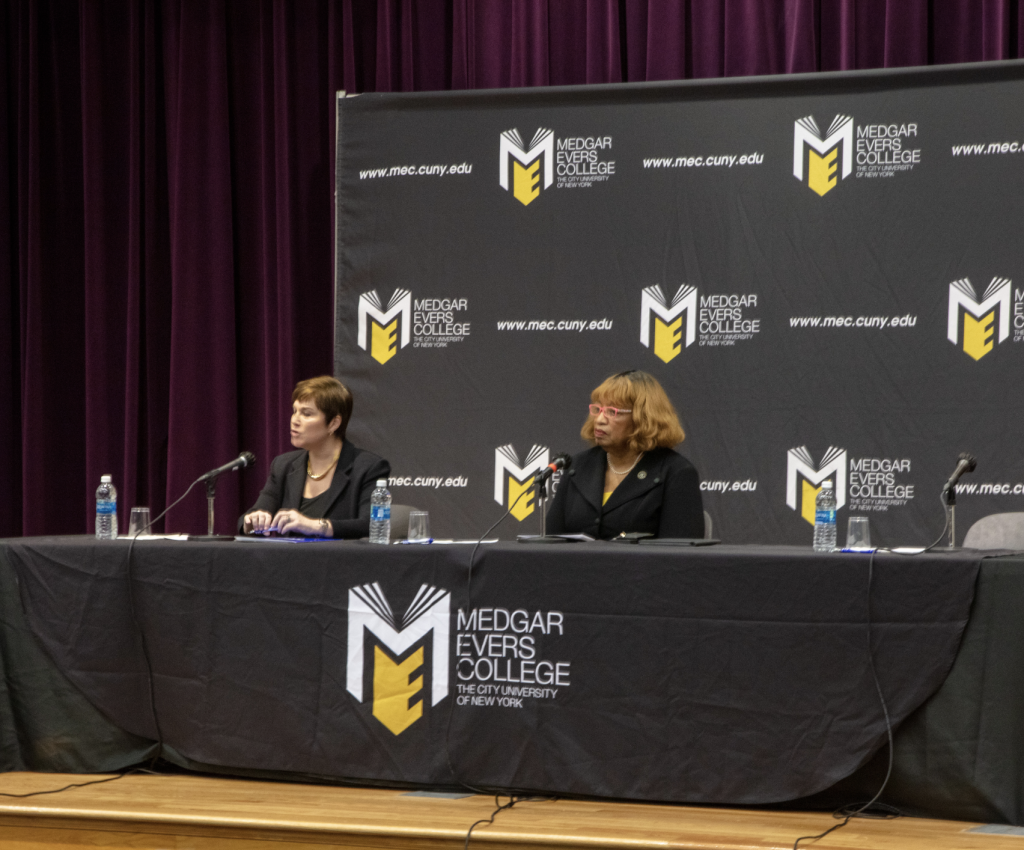CUNY Executive Vice Chancellor Listening Tour Comes to Medgar Evers College
CUNY Executive Vice Chancellor Listening Tour Comes to Medgar Evers College
University Provost Wendy F. Hensel center of one-hour town hall
Since fall 2022, Executive Vice Chancellor and University Provost Wendy F. Hensel has been visiting all 25 CUNY campuses. It is the first comprehensive listening tour of the CUNY system that an executive vice chancellor has undertaken. On March 20, it was Medgar Evers College’s turn. After a brief introduction by President Dr. Patricia Ramsey, Hensel spent the majority of the hour-long event taking questions from students, faculty, and staff who were able to ask questions about CUNY and MEC concerns in real time.

CUNY Executive Vice Chancellor and University Provost Wendy F. Hensel and Dr. Patricia Ramsey, Medgar Evers College President
Sandwiching Hensel’s town hall were meetings with Ramsey, MEC Provost and Senior Vice President for Academic Affairs Dr. Antoinette Coleman, and various department chairs and faculty leaders along with a lunch with students and a campus highlights tour.
The town hall was scheduled as a means for the campus community to engage with the EVC. Proposed budget cuts and the effect it would have on Medgar Evers College were at the heart of many of the questions for EVC Hensel. Following her opening remarks, the first question Hensel was asked had to do with how the hiring freeze would affect departments losing a staff member to resignation or retirement and with a salary in place, how that person could be replaced without adding to payroll. Hensel explained that she is a part of CUNY’s Vacancy Review Board (VRB), a committee created to ensure costs would not impact how the colleges serves its students.
“We are routinely putting forward faculty and staff positions that are put forward pursuant to the campus plans that are in some cases, cost increases, but of course we’re looking for savings or hires that are cost neutral,” she explained. “That is because we all recognize that it serves no purpose to save money while at the same time, killing quality. There is a certain level of investment and strategic investment we have to make in terms of our future, regardless of where we are with the current financial situation. Yes, it takes a little longer. Yes there is a process that has to be followed. But it is not a hiring freeze. I am pleased that we are at that point and that we’re not at the point where we cannot bring in people we know that we need to deliver quality to our students and certainly to make good conditions for our faculty and staff.”
While this listening tour may have been a first-time occurrence, Hensel promised this would be a future ongoing event.
“This is not a one-and-done,” she said. “This is the beginning of a conversation that I hope continues from this point. As you identify things for us to know and your ideas of how to make it better, please communicate with me directly as well as with your wonderful leadership.”